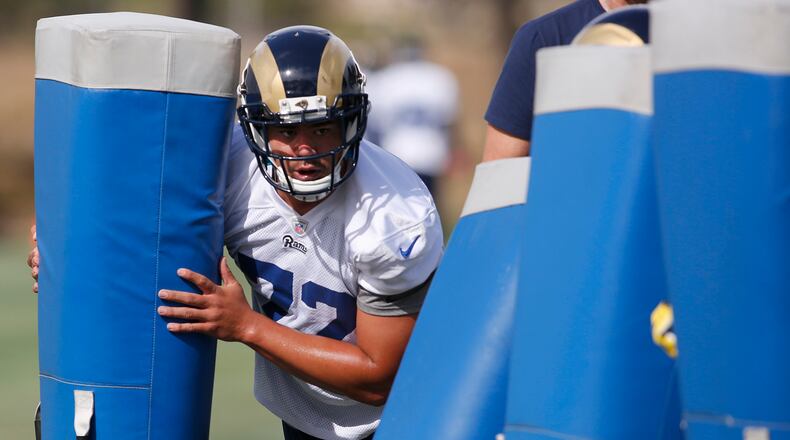The resemblance between Ian Seau and his late uncle, pro football Hall of Famer Junior Seau, is in determination more than DNA, more striking in their love of family, football and the ukulele than in their facial features.
Ian Seau, one of 19 undrafted rookie free agents who participated in the Rams' rookie mini-camp last week in Oxnard, isn't as tall or muscular as his uncle, who played 13 of his 20 NFL seasons in San Diego. Ian Seau, slightly shorter at 6-foot-2 and a bit lighter at 250 pounds, doesn't have his famous relative's athleticism. His strengths are less visible.
"I'm a really hard worker. It's not easy to make me quit. I rarely quit," Ian said. "I go out there and I'm going to compete. I'm going to claw and try and stay a part of this organization, so whatever I have to do, I'm going to find a way to stay on this team."
He had a solid career as a defensive end and outside linebacker at Nevada, where he racked up 10 sacks and 18.5 tackles for loss last season, but he didn't hear his name called on draft day. By contrast, Junior Seau was chosen fifth overall by the Chargers in 1990 out of USC, launching a stellar career as one of the game's premier linebackers.
Three years into retirement he shot himself in the chest and died on May 2, 2012. Doctors concluded he had suffered from chronic traumatic encephalopathy, a degenerative disease found in the brains of people with a history of severe or repeated brain injuries. Approximately 90 former NFL players have tested positive for the disease.
While uncle and nephew were close, Ian said Junior rarely spoke of football or its pitfalls.
"He tried to keep his professional life different from his social life and his family life. He never really talked to me about playing in the NFL," Ian said. "He just told me, 'Hey man, when you're in the league make sure you have a ukulele next to you.' I got my uke out here. Whenever I'm stressed out I can just play that. Just small things he gave me of that nature."
To avoid causing a fuss, Junior Seau would arrive unannounced the few times he attended Ian's games at La Jolla Country Day School and La Costa Canyon High in Carlsbad. "Watching Ian play football, even basketball, he pulled me aside and said that he reminds me how I used to play, when I played basketball and football," said Mary Seau, Junior's sister and a single mother to Ian and daughter Shannalei. "Junior could not believe that he was a clone of him."
That bond is why Ian misses him keenly now. "I went to his grave sometimes throughout this whole entire process and said, 'Uncle, man, I wish you were here to tell me what to do,' " Ian said. "I'd sit there hoping he gives me an answer. He never does. But it was cool. I wish he was here to talk me through this and sort of ease all this pain."
It's too early to evaluate the chances Ian will stick with the Rams and follow his uncle by playing at the Coliseum as the team returns to Los Angeles following an absence of two decades. The rookies spent the first few days easing into their surroundings and preparing to work with the veterans. He likes the Rams' 4-3 defense and "great defensive line, a great defensive culture in general." He believes he can also play middle linebacker if asked. "He really would like to do this not only for himself but to let Junior know that he didn't give up, that he's the only one that didn't give up," Mary Seau said.
This is his chance to be seen in his own light, not in his uncle's ever-present shadow. "My biggest thing is I don't want people to feel like I'm here because of my uncle's last name," Ian said. "I want them to say I did this on my own, and just being able to be in the same conversation as my uncle, just playing football, that's a blessing. I'm here to make a name for myself as well."
Mary Seau worked two or three jobs to support Ian's football, basketball and track pursuits and Shannalei's volleyball. She believes that without baby-sitting help from Shannalei and without developing a tough skin when parents at La Costa Canyon told Mary, "You need to go back where you came from," Ian would not be where he is now.
She's excited, of course, but she saw the downside of football through her brother's suicide. One reason she works nights as a coordinator in the emergency room department at Scripps Encinitas is so she can spend days developing the nonprofit Mary Seau CTE Foundation, which aims to raise money to support research at Boston University's Center for the Study of CTE. Mary Seau wants to launch low-cost seminars for families of those affected by brain trauma, to help them understand the disease's terrible impact and make informed choices.
Her research leaves her knowledgeable about the risks her son faces. "I would have to say 50 percent of me, I am worried," she said. "But it's not like he's not playing in the NFL because I will always be worried wherever my kids go. If they're working as civilian employment, getting to the grocery store, it's no different than playing in the NFL."
Ian accepts those risks. "It scares me, but football is something that a lot of people do not only to make a good living for themselves but putting themselves in a position to make an impact on people's lives," he said. "That's what the Rams have blessed me with. I'm out here and I'm able to get my name out there and try to influence some kids to make better decisions in life."
About the Author
Keep Reading
The Latest
Featured



